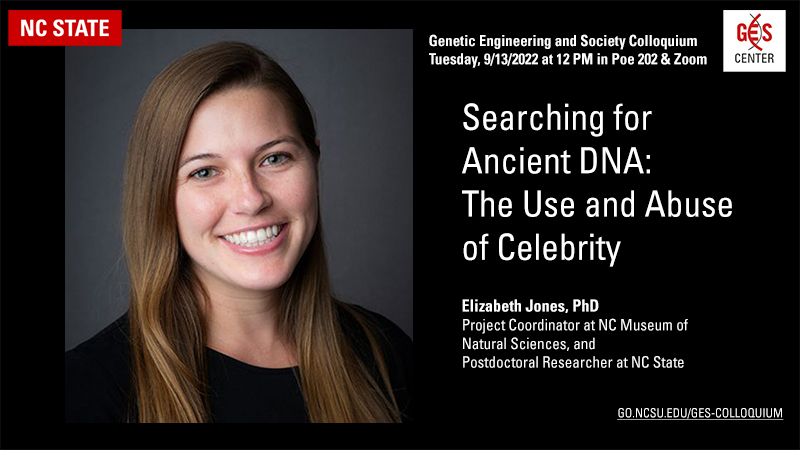
- This event has passed.
Elizabeth Jones – Searching for Ancient DNA: The Use and Abuse of Celebrity | GES Colloquium

Colloquium Home | Zoom Registration | GES Video Library (current) | Video Archives | Podcast | @GESCenterNCSU | Newsletter
Searching for Ancient DNA: The Use and Abuse of Celebrity
Elizabeth Jones, PhD, Project Coordinator at NC Museum of Natural Sciences, and Postdoctoral Researcher in Biological Sciences at NC State
Ancient DNA research has a short but sensational history, especially as the birth of the field coincided with the Jurassic Park craze. Find out how celebrity helped shape the science for better or for worse.
Abstract
Ancient DNA research—the recovery of genetic material from long-dead organisms—is a discipline that developed from science fiction into a reality between the 1980s and today. Drawing on scientific, historical, and archival material, as well as original interviews with more than fifty researchers worldwide, Elizabeth Jones explores the field’s formation and explains its relationship with the media by examining its close connection to de-extinction, the science and technology of resurrecting extinct species.
In this talk, Jones reveals how the search for DNA from fossils flourished under the influence of intense press and public interest, particularly as this new line of research coincided with the book and movie Jurassic Park. She then takes on this reality, diving deeper into the nuance of celebrity to show how media interest simultaneously empowered and undermined the field, and how scientists responded to it both positively and negatively. By investigating the use and (perceived) abuse of celebrity, we arrive at an appreciation for the intricate interplay between science and media, and how the two influence one another.
Related links:
- Ancient DNA: The Making of a Celebrity Science, by Elizabeth D Jones (2022)
Speaker Bio
Dr. Elizabeth Jones is the Project Coordinator in the Zanno Lab for the Cretaceous Creatures public science project at the NC Museum of Natural Sciences and a Postdoctoral Research Scholar at NCSU. She is a Historian of Science and author of the book “Ancient DNA: The Making of a Celebrity Science” (Yale University Press). Jones received her BA in History and Philosophy from NCSU, MA in History and Philosophy of Science from Florida State University, and PhD in Science and Technology Studies from University College London. Her research is interdisciplinary, focusing on the historical, philosophical, and sociological aspects of the scientific process to better understand how science happens and how it impacts society. Throughout her career, she has had first-hand experience working with paleontologists and geneticists in both the field and the lab across the US, UK, and Europe. Prior to her most recent job, Jones was a Project Coordinator and Postdoctoral Research Scholar in the Cooper Lab at NCSU for a NSF grant to create a Toolkit for Data Ethics in the Participatory Sciences in partnership with the Citizen Science Association.
GES Colloquium is jointly taught by Drs. Jen Baltzegar and Dawn Rodriguez-Ward, who you may contact with any class-specific questions. Colloquium will be held in-person in Poe 202, as well as live-streamed via Zoom. Please subscribe to the GES newsletter and Twitter for updates .